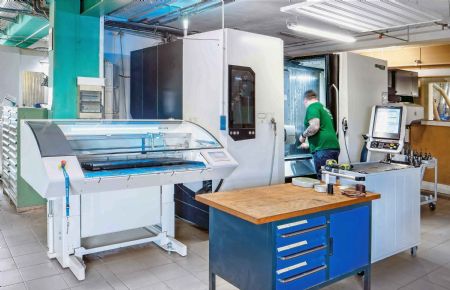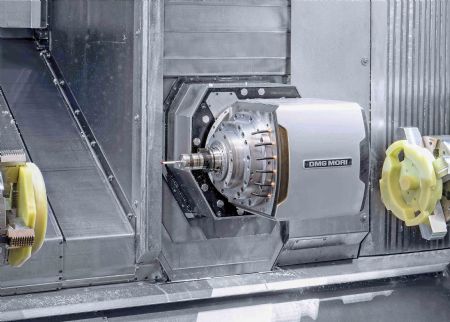 Klaus Ament (left), founder and CEO of Ament Plastics, with production manager Erik Fleischmann
Klaus Ament (left), founder and CEO of Ament Plastics, with production manager Erik FleischmannGerman sub-contractor
Ament Plastics GmbH has been producing complex precision components from technical plastics since 2005, mostly individual parts and small series. Long-standing customers in the automotive, medical and aerospace industries in particular rely on the experience of the 25-strong team, especially as thermosetting plastic components, which are notoriously difficult to machine, account for 70% of production.
To allow it to turn, mill and drill these materials more efficiently in one hit, in 2022 the contract machining specialist invested in a CLX 450 TC twin-spindle turn-milling centre from
DMG Mori as part of a capacity expansion and process optimisation exercise. Thanks to six-sided complete machining of components in one visit to the machine, rather than having to reclamp the parts on another machine to be completed, the company has been able to reduce throughput times, raise quality and increase production flexibility.
 Pictured left: the DMG Mori CLX 450 TC turning centre at Ament Plastics is fed with bar from a Breuning IRCO magazine and there is a container on the right hand side for finished parts, allowing production of smaller components to run unattended during night shifts
Pictured left: the DMG Mori CLX 450 TC turning centre at Ament Plastics is fed with bar from a Breuning IRCO magazine and there is a container on the right hand side for finished parts, allowing production of smaller components to run unattended during night shiftsCompared to thermoplastics, which Ament also machines, thermosets place significantly higher demands on machining. Explaining the difference between the two materials, company founder and CEO Klaus Ament said: “While the first produces normal chips, thermosetting plastics produce dust that must be flushed away, which results in an aggressive slurry. Depending on the application, however, for example in electrical engineering, we cannot use coolant at all because the material absorbs too much moisture, so the dust must be extracted.”
He commented further that, in the case of laminated thermosets made from synthetic resins, the layers consist of hard paper, cotton fabric or, since the middle of the 20th century, epoxy glass fibre. The latter in particular is very abrasive, which means that harder tools are required. Every plastic has its own parameters, which Ament’s experienced engineers have to bear in mind during production.
Five-axis machining centres and modern CNC turning machines with driven tools are now standard production platforms for processing these materials. Erik Fleischmann, Ament’s production manager said: “Our previous production methods involved at least two machine tools and repeated reclamping, which takes much longer, ties up machine capacity and compromises accuracy. Investment in the CLX 450 TC was therefore a major milestone for us.”
Compact footprintTogether with a colleague, Erik Fleischmann was responsible for the acquisition of the turn-mill centre. Good experience with similar older machines from Gildemeister, which is now part of DMG Mori, led him to approach the machine tool manufacturing group. The CLX 450 TC was chosen due to its compact footprint, as space on the shopfloor is limited in Wernberg-Köblitz.
 Pictured right: machining area of the CLX 450 TC, showing the main and counter spindles, the compactMASTER turn-mill tool spindle and plastic components being machined from billet
Pictured right: machining area of the CLX 450 TC, showing the main and counter spindles, the compactMASTER turn-mill tool spindle and plastic components being machined from billetWith X, Y and Z-axis travels of 750 x 200 x 1,100mm, the CLX 450 TC is capable of producing a wide variety of components. A counter spindle and the compactMASTER turn-mill tool spindle make it a versatile production centre for one-hit production.
The machine is equipped with a Breuning IRCO bar loader and a container for finished parts, allowing production to run unattended overnight. If required, Mr Fleischmann integrates in-process measurement, which is generally employed when producing a series of parts so that their quality can be continuously monitored within the working area, saving subsequent inspection time.
Mr Ament concluded: “Despite attractive environment working with technical plastics, it is a major challenge to find skilled machine operators and trainees. Complete machining and a high degree of process integration will therefore remain an important criterion when we invest in further machine tools.”